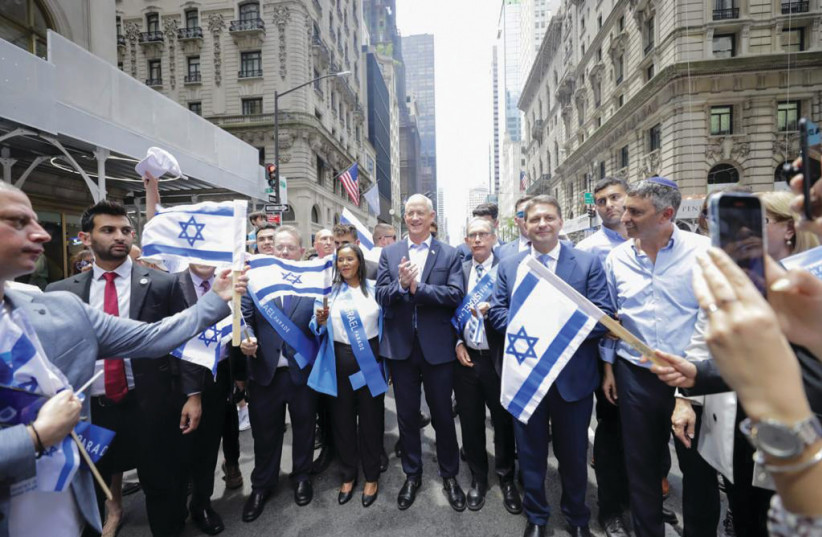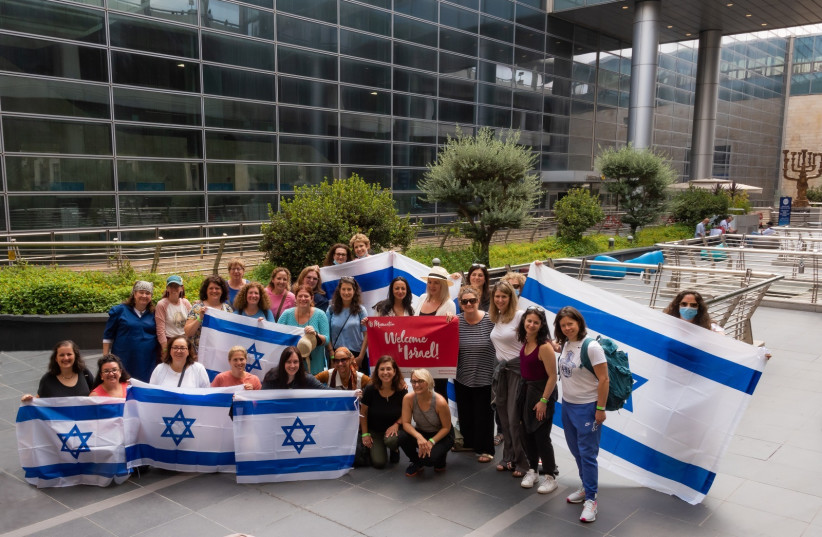In a way, Russian President Vladimir Putin did Diaspora Affairs Minister Nachman Shai a favor.
Until Russia invaded Ukraine, it seemed that the ministry – under the new leadership of a representative of the Labor Party and after a decade of ministers from Orthodox backgrounds – had been unable to promote new programs.
Yet the Diaspora Affairs Ministry was one of the first official Israeli entities to enlist in providing assistance to Ukrainian Jews. Chabad and the American Jewish Joint Distribution Committee (JDC) invested NIS 10 million to allow further support for refugees both in Ukraine and in the surrounding countries that had received them. Heads of organizations in Ukraine say that Shai is wholly devoted to the endeavor, and is planning to assist them next year as well.
Finally, the minister had an accomplishment under his belt, and an impressive one, in light of how fragile is the political situation.
Shai actually started off well since the Bennett-Lapid government was established a year ago. On one of his first days on the job, he flew to Surfside, Florida, at the request of Prime Minister Naftali Bennett to lend support to South Florida’s Jewish community, after a condominium collapsed and trapped dozens of members in the rubble.

He did what he knows how to do best: being a diplomat and representing Israel on international media. He interviewed on all the major American networks, and showed the world that Israel is a country that promotes humanitarian aid.
Expectations vs. reality
As a former senior IDF officer and spokesperson, and head of the Israeli office of the Jewish Federations of North America, Shai was held to the highest expectations by many Jewish organizations. He’s also in the major leagues of Israeli politicians when it comes to media, visibility and respect.
Some heads of organizations criticized him for doing too many interviews that had no connection to the mandate he received: Israel-Diaspora relations. He became the de facto government spokesperson for issues of corona, and he spoke critically about how Israel managed the crisis over the death of Al Jazeera journalist Shireen Abu Akleh.
"Our credibility is not high during these events."
Diaspora Affairs Minister Nachman Shai
“Our credibility is not high during these events,” Shai said in an interview on 103 FM. He received criticism from Israelis on both sides of the political spectrum.
“We haven’t been able to promote any projects with the ministry in the past year,” said a senior official in one of the larger Jewish organizations. “Many heads of organizations have tried to promote joint ventures with the ministry but haven’t succeeded.”
Others say that Shai was busy promoting himself as the next chairman of the Jewish Agency, and that he was distracted from running his own office.
During its first days in office, the ministry announced the establishment of a special unit that would be in charge of promoting and nurturing “Jewish Renewal” in Israel, with a budget of NIS 60 million going to many organizations promoting Jewish values in the Jewish state. A fifth of the sum will go to the Reform and Conservative movements. In the next few days, this initiative will finally be launched; many figures involved say it is long overdue.

Mosaic United
ONE OF the surprising successes of Shai’s year as minister was the stabilization and growth of the Mosaic United joint venture. The flagship venture of its former director-general Dvir Kahana, it was touted as one of the most groundbreaking and cutting-edge Jewish organizations in the world. Yet Mosaic was struck with management problems from the get-go, and went through various changes in its leadership, causing it to become an unclear entity with few of its goals achieved.
During the past year and under the leadership of the ministry’s talented Dir.-Gen. Tziona Koenig-Yair and Shai, Mosaic United has transformed into the most stable and growing project in which the ministry invests. The government passed a historic decision guaranteeing funding of NIS 180 million for Mosaic and turning it into a project that is an official part of the State of Israel’s strategy vis-a-vis the Diaspora.
In addition, Koenig-Yair paved the way to change the funding model, which allows for further flexibility in Mosaic’s activities – moving from a 1:2 ratio of government versus philanthropic funding, to a 1:1 ratio in most projects. This makes it easier to recruit partners for the organization’s operations.
Slowly, Mosaic has become involved with many topics that the Israeli government never dealt with. It supports Jewish life in communities of Israeli expats around the world, particularly in Europe. It helps Jewish summer camps host Ukrainian refugees with special funding. And it will soon begin to operate with RootOne, a new initiative that aims to help bring tens of thousands of Jewish teens from the US and Canada to Israel on immersive summer trips.
In addition, almost all heads of programs funded by the ministry either quit or were fired. There are many reasons for this, but the bottom line is that they weren’t able to maintain stability. Furthermore, a number of personal advisers to Shai – his spokesperson and two other key aides – decided to leave due to tension with him and complaints that the atmosphere in his office had grown “too strained.”
Diaspora Week
One project that was highly successful is Diaspora Week, which was happily celebrated this year. Activities and events took place throughout the country, including on IDF bases and throughout the education system. It was detailed by the media and events took place at the Knesset and other venues.
A project that is still in its first stages is called “The Digital Project.” A pilot is taking place in France, with a marketing campaign to get tailored Jewish and Israeli content to young French Jews.
One of the ministry’s accomplishments was building infrastructure in a project “for young leadership that aims to connect the younger generation to the State of Israel.” Agreements to the tune of approximately NIS 20 million are currently being promoted.
The bottom line is that the current management of the Diaspora Affairs Ministry is very different from the previous one. The agenda is more progressive and liberal, but the goals and actions are yet to be articulated in a clear and strategic way. Although quite a few of Shai and Koenig-Yair’s projects were successful, other projects appear to remain stuck or in their fledgling stage.
Shai’s power and leverage as a politician has allowed him and his ministry to reach new heights and accomplishments. He was the only minister fighting consistently for the implementation of the Kotel compromise – something that you would expect many other ministers to do.
One thing that might help is having Shai stay focused on what he is supposed to do: investing in Israeli-Diaspora relations and spearheading those efforts on behalf of the government. He does a great job at it, so that’s where his focus should be.
